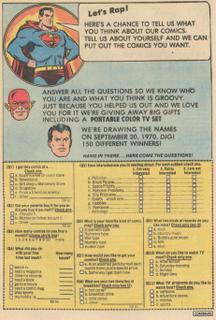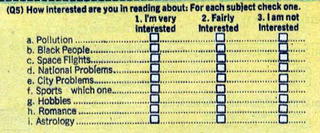In traditional mainstream American forms of entertainment non-caucasian characters began to have a greater public profile in televison, film and literature. This was due to many external pressures on the industry such as reality, demographics and marketing. These factors prodded the entertainment industry to seek out and work a little harder for the attention of an audience that they previously gave short-shrift to. This growing realization of a source of previously semi-ignored potential income pushed the sometimes sincere, often cynical and exploitative storylines that were common in media of the era. Many shows left the audience at the end of the story with the lesson that the character was "a credit to your gender/race". Condescending and insulting, it may have actually been the best the writers and producers were allowed to do given hesitant sponsors and interfering censors that were still extant from the "bad old days".
As an example of this, in 1968 the first interracial kiss on broadcast television was on the Star Trek episode Plato's Children, between Capt. Kirk and Lt. Uhura. This was considered scandalous for the time and ground-breaking, shattering barriers.
 Yet...many people forget that the premise of the episode was that the protagonists had to be forcedto embrace by their cruel telepathic/telekinetic captors. Hardly the passionate smooch it should have been. I would submit that the scene was actually the first forced interracial male/female rape on television, something in my mind that is much more taboo-shattering than a kiss. That characters were not in control of their own bodies may have been the only way the kiss could have been accomplished and made palatable to middle-America.
Yet...many people forget that the premise of the episode was that the protagonists had to be forcedto embrace by their cruel telepathic/telekinetic captors. Hardly the passionate smooch it should have been. I would submit that the scene was actually the first forced interracial male/female rape on television, something in my mind that is much more taboo-shattering than a kiss. That characters were not in control of their own bodies may have been the only way the kiss could have been accomplished and made palatable to middle-America.To the show's credit, both characters displayed anger and humiliation at their abuse. It was gratifying that Nichelle Nichols did not play the role of some space-ingenue, as women in the genre are often expected to do.
This new idea, that America and even the world beyond was actually populated by more than the sterotypical TV family of WASPs, led to the realization by business that the time was right to aggresively pursue additional sources of income.
While by 1970 the civil rights movement was already going strong, a lot of progress was yet to be made. Economics is, wrongly or rightly, only one of the many avenues that leads to greater civil rights and freedom. Oppression of the masses can really get in the way of effective advertising. As economic standards improve, as awareness grows, as niches are exploited, business takes notice. If someone was sure they could profit off the left-handed Easter Island tribe demographic, you can be sure there would be a shoe and soda commercial featuring them prominently. No business stays solvent for very long if they ignore an available group of end-users. Comic book publishers are no exception.
Take a good look at the following 2-page reader survey (clicking on them opens a larger picture). As surveys go it asks the usual questions to determine just who is reading and buying their comics. You can see questions that help determine household, income, what they eat, hobbies, etc. This survey was unusual in that DC wanted it returned not long after the issue hit the stands. Participants were entered in a drawing for a chance to win some pretty good prizes. Winners are listed below the survey.

Then you get to section Q5, asking "How Interested Are You About Reading About...".
In part A the subject is environmental, with "Pollution". Part B asks about "Black People". Section D & E inquire about "National" & "City Problems", respectively. The remaining questions are what appears to me as innocuous filler, as these questions were asked in another manner elsewhere in the survey.

The survey is conspicuous in not asking about the almost equally large Asian demographic. It also ignores Hispanic, Native American and other groups. I think that one of the purposes of the survey was to asses the viability of a more aggressive pursuit in the African-American market. This may have reflected a national trend. What is presented here on the microcosmic may be what was happening in 1970 on a macro-level. As one culture or ethnic group is fully absorbed into mainstream society the remaining are marginalized. At least until the next phase is implemented. In 1970 the anti-war protest fad was in full swing, but the Asian demographic may not have been considered attractive to general society or business. I think that just because people didn't want the United States to bomb a foreign country doesn't mean they also wanted the refugees living next door.

The interesting thing about this is that truthfully, in Marvel and DC stories had been already appearing that featured characters in more "realistic" settings such as urban neighborhoods, schools, low income, etc. Some of the Iron Man issues come to mind. And lest we forget, the later Green Lantern/Green Arrow "relevancy" issues in particular.
A few months later in Action #398 the survey winners were announced. DC claims over 100,000 people participated and the list of winners is pretty respectful. If circulation was at least a million as I've heard it may have been back then, then that percentage is not a bad showing and the survey results may have closely represented the readership. The survey just may have been something other than a stunt to increase sales and could have influenced future editorial policy.
Tags: Comic Book Public Service Announcement Star Trek Race relations







![[English] Remember Tomorrow: Demands vs. tools provided. The setup](https://blogger.googleusercontent.com/img/b/R29vZ2xl/AVvXsEh-oqoUOTcm6y7N3QIHypJfFISwphApGIJVLofPindXytZnJ0_XLoVzumqQHmwlZUALYE4s9rV20-JE8gOGeQNGW19tVN9xivlpPPYzqf-eDT8mHsfhZVFtAoWSjLIRsAciXsTMuc32LNY/w100/yasmin1.png)
0 Yorumlar